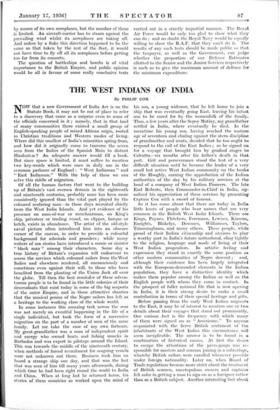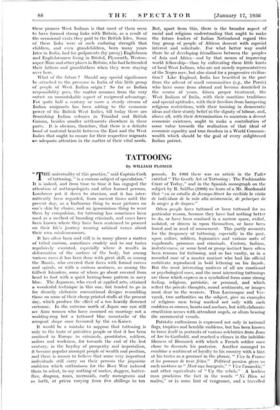THE WEST INDIANS OF INDIA
By PHILIP COX NOW that a new Government of India Act is on the Statute Book, it may not be out of place to refer to a discovery that came as a surprise even to some of the officials concerned in it ; namely, that in that land of many communities there existed a small group of English-speaking people of mixed African origin, rooted in Christian traditions and Western modes of living. Where did this smallest of India's minorities spring from, and how did it originally come to traverse the seven seas from the Indies of the Spanish Main to distant Hindustan ? An adequate answer would fill a book. But since space is limited, it must suffice to mention two key-words which were once in daily use in the common parlance of England : " West Indiaman " and " East Indiaman." With the help of these we can solve this riddle of migration.
Of all the human factors that went to the building up of Britain's vast oversea domain in the eighteenth and nineteenth centuries, probably none has been more consistently ignored than the vital part played by the coloured seafaring man—in those days recruited chiefly from the West India Islands. And yet evidence of his presence on man-of-war or merchantman, on King's ship, privateer or trading vessel, on clipper, barque or ketch, exists in abundance. The artist of the old-style naval picture often introduced him into an obscure corner of the canvas, in order to provide a colourful background for admirals and grandees ; while many writers of sea stories have introduced a comic or sinister " black man '= among their characters. Some day a true history of Britain's expansion will endeavour to assess the services which coloured sailors from the West Indies and elsewhere rendered, all unconsciously and sometimes even against their will, to those who have benefited from the planting of the Union Jack all over the globe. Till then the best reminder of these adven- turous people is to be found in the little colonies of their descendants that exist today in some of the big seaports of the outer Empire, and in those attractive shanties that the musical genius of the Negro sailors has left as a heritage to the working class of the whole world.
In some instances this amazing trek across the seas was not merely an eventful happening in the life of a single individual, but took the form of a successive migration on the part of a number of men of the same family. Let me take the case of my own forbears. My great-grandfather was a man of independent spirit and energy who owned boats and fishing smacks in Barbados and was expert in pilotage around the Island. This was towards the middle of the nineteenth century, when methods of forced recruitment for seagoing vessels were not unknown out there. Business took him on board a strange ship one day, and that was the last that was seen of him till many years afterwards, during which time he had been right round the world to India and China. When at long last he returned home, his stories of these countries so worked upon the mind of his son, a young widower, that he left home to join a ship that was eventually going East, leaving his infant son to be cared for by the womenfolk of the family. Thus, a few years after the Sepoy Mutiny, my grandfather settled in India, where eventually he died. In the meantime his young son, having reached the mature age of seventeen and chafing against the stern discipline of grandmother and aunts, decided that he too ought to respond to the call of the East Indies ; so he signed on for a voyage that brought him by gradual stages to Calcutta—six months after his father's death in that port. Grit and perseverance stood the test of a very difficult situation until he became the leader of a very small but active West Indian community on the banks of the Hooghly, earning the approbation of the Indian authorities of the day by his military services at the head of a company of West Indian Pioneers. The late Earl Roberts, then Commander-in-Chief in India, sig- nalised his appreciation of these services by presenting Captain Cox with a sword of honour.
So it has come about that there are today in India little knots of people who bear names that are very common in the British West India Islands. There are Kings, Paynes, Fletchers, Foremans, Lewises, Kinsons, Enrights, Blakelys, Downses, Williamscs, Taylors, Trimminghams, and many others. These people, while proud of their Indian citizenship and anxious to play a worthy part in India's future nationhood, cling tightly to the religion, language and mode of living of their West Indian progenitors. In artistic feeling and expression they stand in exactly the same position as other modern communities of Negro descent ; and, although their existence has been largely integrated with the European-descended elements in the Indian population, they have a distinctive identity which makes them popular among the Indian as well as the English people with whom they come in contact. In the prospect of fuller national life that is now opening in India, it is their strong desire to make a small contribution in terms of their special heritage and gifts.
Before passing from the early West Indian migrants to the East, it may be of interest to mention one or two details about their voyages that stand out prominently. One curious fact is the frequency with which many of them were signed on as " Americans." To anyone acquainted with the fierce British sentiment of the inhabitants of the West Indies this circumstance will seem inexplicable. The answer is to be found in a combination of historical causes. At first the desire to escape the attentions of the press-gangs was re- sponsible for masters and seaman joining in a subterfuge, whereby British sailors were enrolled whenever possible under foreign nationality. Later on, when Board of Trade regulations became more strict about the treatment of British seamen, unscrupulous owners and captains felt safer in getting a man to sign on as a foreigner rather than as a British subject. Another interesting fact about these pioneer West Indians is that most of them seem to have formed strong links with Britain, as a result of the occasional visits they paid to the British Isles. Some of these links were of such enduring strength that children, and . even grandchildren, born many years later in India, had for godparents (by proxy) Englishmen and Englishwomen living in Bristol, Plymouth, Weston- super-Marc and other places in Britain, who had befriended their fathers and grandfathers when they were staying over here.
What of the future ? Should any special significance be attached to the presence in India of this little group of people of West Indian origin ? So far as Indian responsibility goes, the matter assumes from the very outset an unmistakable aspect of reciprocal advantage. For quite half a century or more a steady stream of Indian emigrants has been adding to the economic power of the British West Indies, till today there are flourishing Indian colonies in Trinidad and British Guiana, besides smaller settlements elsewhere in these parts. It is obvious, therefore, that there is a definite bond of material benefit between the East and the West Indies that ought to ensure for their respective migrants an adequate attention in the matter of their vital needs. But, apart from this, there is the broader aspect of racial and religious understanding that ought to make the future leaders of Indian Nationhood regard this tiny group of people of African descent with especial interest and solicitude. For what better way could there be of developing friendliness between the peoples of Asia and Africa—and by that means of improving World • fellowship—than- by cultivating these little knots of local West Indians, who are not merely representativeS of the Negro race, but also stand for a progressive civilisa- tion ? Like England, India has benefited in the past from the advent of small communities (e.g., the Parsis) who have come from abroad and become domiciled in the course of years. Given proper treatment, the West Indians of India, with their maritime traditions and special aptitudes, with their freedom from hampering religious restrictions, with their training in democratic ideas and their sturdy belief in the dignity of labour, and, above all, with their determination to maintain a decent economic existence, ought -to make a contribution of some value towards the realisation of that ideal of economic equality and true freedom in a World Common- wealth which should be the goal of every enlightened Indian patriot.







































 Previous page
Previous page